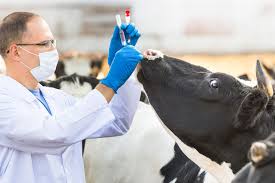Latest BSE Scare for Ireland
BSE or Bovine Spongiform Encephalopathy has again caught public attention with an isolated case confirmed on a farm in County Louth on the 11th of June.
BSE is a disease that damages the brain and central nervous system and eventually leads to the death of adult cattle. An unknown fact about BSE is that an infected animal may not show any symptoms for between four to six years. Some of the symptoms can include disorientation, clumsiness and aggressive behaviour towards other animals and indeed humans. BSE only affects animals; however a human disease called Creutzfedlt-Jakob-Disease (CJD) may be linked to BSE. Some individuals who developed CJD in the United Kingdom are known to have consumed BSE infected meat products.
The first case of BSE occurred in the UK in 1986. This disease spread to Ireland and resulted in over 22,400 animals being killed with a cost to the Irish Government of €23,800,000 by 1996 alone. It is believed to have spread by cattle consuming contaminated meat and bone meal. As a result of these outbreaks, the State introduced a strict scrutiny of cattle fatalities throughout the entire country. A number of measures have been put in place to reduce the risk of BSE spreading and affecting the cattle population in Ireland. These include:
- A Cattle Movement Monitoring System, which tracks the location of all animals in the entire country.
- Pre-examination of cattle by a veterinary inspector, ensuring that only healthy animals are slaughtered for human consumption.
- Screening of all suspect cattle using an approved test.
- On-going audit by the Food Safety Authority of Ireland (FSAI) on the effectiveness of controls.
- The exclusion of all meat and bone meal products from the animal.
These control procedures, and more besides, have ensured that BSE cases remained solitary outbreaks, just like the latest occurrence in Louth this month. These procedures have been so successful that Ireland became the first European nation to be allowed back into the United States beef market following a sixteen year ban. Ireland also recently received an award from the World Organisation for Animal Health recognising Ireland’s BSE free status.
This latest case may have been a setback in terms of our beef export market and may also have had a negative impact on our reputation with our new markets in Japan, China and the United States. However, this is not an outbreak and is considered an isolated incident and officials have stated that it will not affect trade with new and emerging markets.
The important point to note is that the procedures put in place to reduce the risks of the spread of BSE in Ireland are working and the cases that do appear are thankfully just isolated incidents. These procedures therefore need to be adhered too and enforced, in order to ensure the safety of our food produce and to continue the growth of the Irish Food exporting market.
Tags: Food Safety, FSAI, Animal, BSE, Controls, Exports, Safety Procedures, Trade


